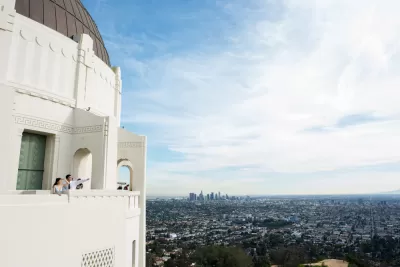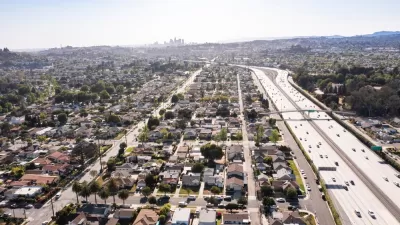Most people would probably guess that the world's most sprawling city is located in the United States, and according to most measures, they'd be right.

Douglas Murphy examines the issue of sprawl and its effects, devoting significant word count to an argument for sprawl as a destructive force for the environment and for society.
After acknowledging that there is "no reliable combined measure of sprawl, and many geographers shy away from using the term because of its negative connotations," Murphy still surveys some of the most prominent attempts to measure sprawl using a scientific method.
First mentioned is the Demographia's annual World Urban Areas [pdf] survey, which shows American areas completely dominating the low densities: "the lowest density large cities are Atlanta, Boston, St Louis, Orlando and San Juan. The only real competition the Americans have is with places like Brisbane, Australia, or Quebec City, Canada, both countries with a lot of land and a love of the car."
Second among the sprawl studies listed by Murphy is the work of researchers at Smart Growth America, which introduces "mixes of use, presence of 'centres', and accessibility as other factors," into their measure of sprawl. That study places southern cities like Atlanta, Nashville and Memphis at the bottom of the sprawl list.
Finally, Murphy cites the work of Thomas Laidley at NYU, who recently created a Sprawl Index using aerial imagery. "One remarkable aspect was the discovery that Los Angeles is now the densest urban centre in the US," explains Murphy.
That final mention doesn't reconcile with Murphy's opinion, however, of Los Angeles as "the ultimate sprawling city." Murphy writes:
Think of the classic view from the Griffith Observatory, looking down at that vast carpet of concrete with its threads of light from the clogged highways. LA is decentred, potentially limitless, and stands for everything terrible about what happens when cities are developed without planning: swathes of low density housing, completely severed by roads, the whole terrain plagued by filthy smog.
Thus, Murphy produces a perhaps surprising pro-planning argument from this critique of a century's worth of planning practice.
FULL STORY: Where is the world's most sprawling city?

Montreal Mall to Become 6,000 Housing Units
Place Versailles will be transformed into a mixed-use complex over the next 25 years.

Planetizen Federal Action Tracker
A weekly monitor of how Trump’s orders and actions are impacting planners and planning in America.

Four Reasons Urban Planners Can’t Ignore AI
It’s no longer a question of whether AI will shape planning, but how. That how is up to us.

Bend, Deschutes County Move to Restrict Major Homeless Encampment
City and county officials are closing off portions of an area known as Juniper Ridge where many unhoused residents find shelter, hoping to direct people to housing and supportive services.

High Housing Costs Driving Down Transit Ridership in LA
When neighborhoods gentrify and displace lower-income residents, transit ridership suffers, new research shows.

Iowa Legalizes Accessory Dwelling Units
A new law will allow property owners to build ADUs on single-family lots starting on July 1.
Urban Design for Planners 1: Software Tools
This six-course series explores essential urban design concepts using open source software and equips planners with the tools they need to participate fully in the urban design process.
Planning for Universal Design
Learn the tools for implementing Universal Design in planning regulations.
City of Camden Redevelopment Agency
City of Astoria
Transportation Research & Education Center (TREC) at Portland State University
City of Camden Redevelopment Agency
Municipality of Princeton (NJ)
Regional Transportation Commission of Southern Nevada





























